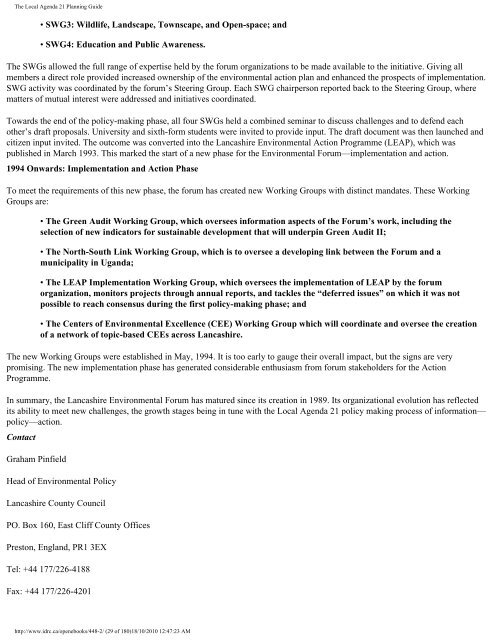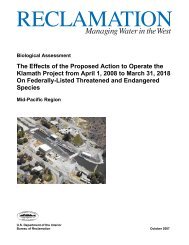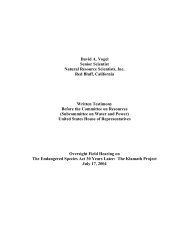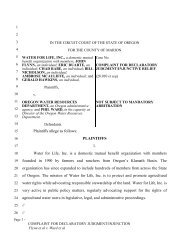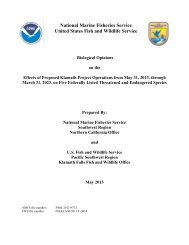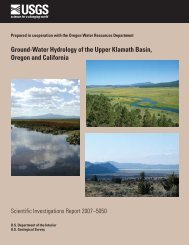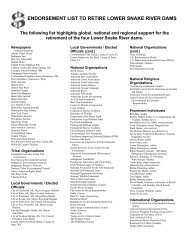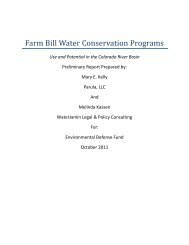The Local Agenda 21 Planning Guide - Democrats Against UN ...
The Local Agenda 21 Planning Guide - Democrats Against UN ...
The Local Agenda 21 Planning Guide - Democrats Against UN ...
Create successful ePaper yourself
Turn your PDF publications into a flip-book with our unique Google optimized e-Paper software.
<strong>The</strong> <strong>Local</strong> <strong>Agenda</strong> <strong>21</strong> <strong>Planning</strong> <strong>Guide</strong><br />
• SWG3: Wildlife, Landscape, Townscape, and Open-space; and<br />
• SWG4: Education and Public Awareness.<br />
<strong>The</strong> SWGs allowed the full range of expertise held by the forum organizations to be made available to the initiative. Giving all<br />
members a direct role provided increased ownership of the environmental action plan and enhanced the prospects of implementation.<br />
SWG activity was coordinated by the forum’s Steering Group. Each SWG chairperson reported back to the Steering Group, where<br />
matters of mutual interest were addressed and initiatives coordinated.<br />
Towards the end of the policy-making phase, all four SWGs held a combined seminar to discuss challenges and to defend each<br />
other’s draft proposals. University and sixth-form students were invited to provide input. <strong>The</strong> draft document was then launched and<br />
citizen input invited. <strong>The</strong> outcome was converted into the Lancashire Environmental Action Programme (LEAP), which was<br />
published in March 1993. This marked the start of a new phase for the Environmental Forum—implementation and action.<br />
1994 Onwards: Implementation and Action Phase<br />
To meet the requirements of this new phase, the forum has created new Working Groups with distinct mandates. <strong>The</strong>se Working<br />
Groups are:<br />
• <strong>The</strong> Green Audit Working Group, which oversees information aspects of the Forum’s work, including the<br />
selection of new indicators for sustainable development that will underpin Green Audit II;<br />
• <strong>The</strong> North-South Link Working Group, which is to oversee a developing link between the Forum and a<br />
municipality in Uganda;<br />
• <strong>The</strong> LEAP Implementation Working Group, which oversees the implementation of LEAP by the forum<br />
organization, monitors projects through annual reports, and tackles the “deferred issues” on which it was not<br />
possible to reach consensus during the first policy-making phase; and<br />
• <strong>The</strong> Centers of Environmental Excellence (CEE) Working Group which will coordinate and oversee the creation<br />
of a network of topic-based CEEs across Lancashire.<br />
<strong>The</strong> new Working Groups were established in May, 1994. It is too early to gauge their overall impact, but the signs are very<br />
promising. <strong>The</strong> new implementation phase has generated considerable enthusiasm from forum stakeholders for the Action<br />
Programme.<br />
In summary, the Lancashire Environmental Forum has matured since its creation in 1989. Its organizational evolution has reflected<br />
its ability to meet new challenges, the growth stages being in tune with the <strong>Local</strong> <strong>Agenda</strong> <strong>21</strong> policy making process of information—<br />
policy—action.<br />
Contact<br />
Graham Pinfield<br />
Head of Environmental Policy<br />
Lancashire County Council<br />
PO. Box 160, East Cliff County Offices<br />
Preston, England, PR1 3EX<br />
Tel: +44 177/226-4188<br />
Fax: +44 177/226-4201<br />
http://www.idrc.ca/openebooks/448-2/ (29 of 180)18/10/2010 12:47:23 AM


